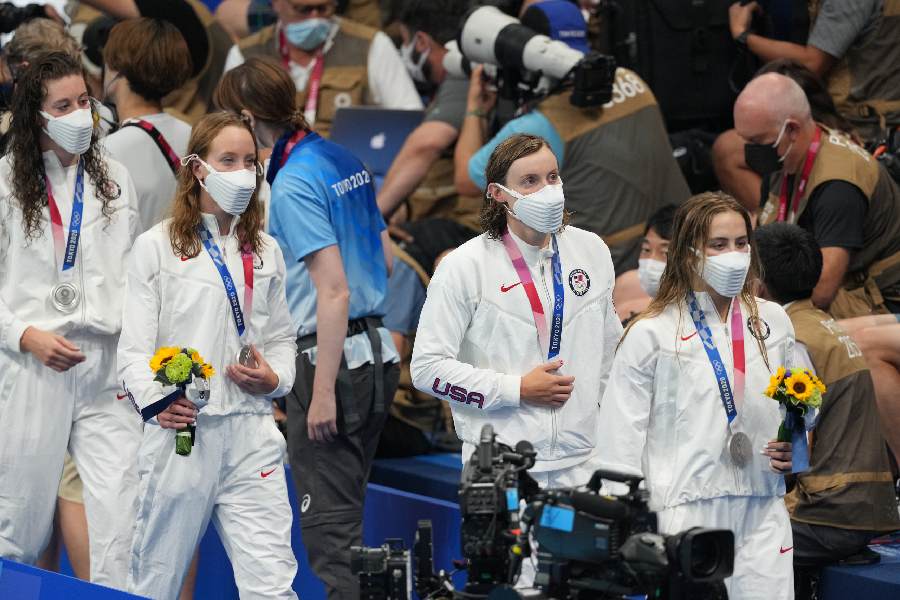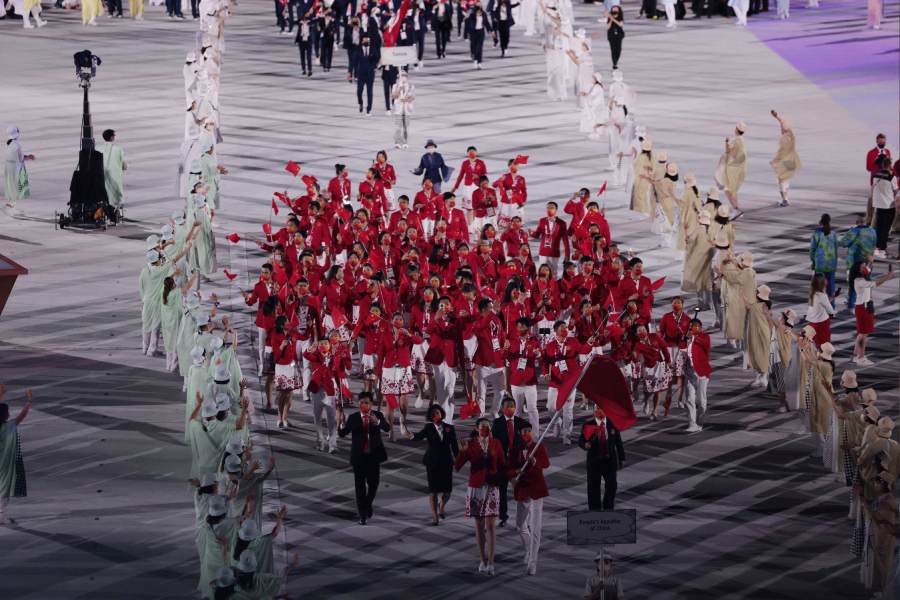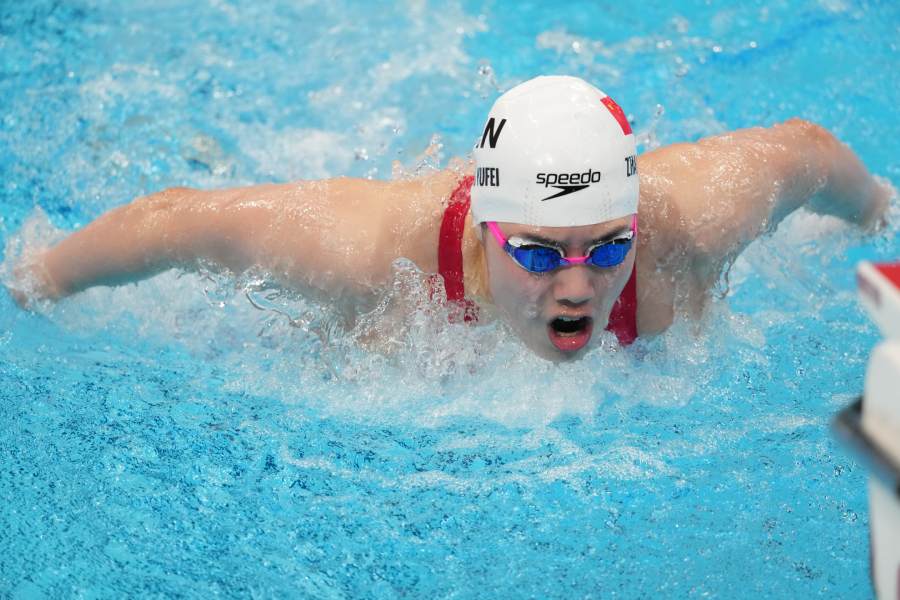The revelation that 23 Chinese swimmers tested positive for a banned drug seven months before the Tokyo Olympics but were secretly cleared and allowed to continue competing has exposed a bitter and at times deeply personal rift inside the sport, and brought new criticism of the global authority that oversees drug testing.
A New York Times investigation uncovered previously unreported details of the 2021 episode, in which a contingent of Chinese swimmers, including nearly half of the team that China sent to the Tokyo Games, tested positive for a banned prescription heart medicine that can help athletes increase stamina and reduce recovery times.
Within hours, the disclosure of an incident that had been a secret for more than three years had drawn strong reactions from athletes, coaches and others in the fight to keep drugs out of elite sports.

FILE — Allison Schmitt, Paige Madden, Katie Ledecky and Katie McLaughlin of the U.S. with their silver medals after the 4 x 200 meter freestyle final during the Tokyo 2020 Olympics, at the Tokyo Aquatics Center, July 29, 2021. The revelation that 23 Chinese swimmers tested positive for a banned drug seven months before the Tokyo Olympics but were secretly cleared and allowed to continue competing has exposed a bitter and at times deeply personal rift inside the sport, and brought new criticism of the global authority that oversees drug-testing. Doug Mills/The New York Times
An American Olympian who took home a silver medal from Tokyo said she felt her team had been “cheated” in a race won by China. A British gold medalist called for a lifetime ban for the swimmers involved. The sports minister in Germany, where a documentary on the case was broadcast Sunday, demanded an investigation. And a simmering feud between officials at the World Anti-Doping Agency, the global regulator known as WADA, and their U.S. counterparts burst into the open in a flurry of caustic statements and legal threats.
China’s anti-doping agency, known as Chinada, acknowledged the positive tests in a response to questions last week but said the swimmers had ingested the banned substance unwittingly and in tiny amounts, and that no action against them was warranted. WADA, saying it had no “credible evidence” to challenge China’s version of events, said it had declined to impose suspensions, disqualifications or even make any public announcement that they had tested positive.
In many ways, the fight over the Chinese positives is one about process. In all but the rarest circumstances, any athlete who tests positive for a powerful banned drug like the one in question, trimetazidine, is subject to at least a provisional suspension while an investigation takes place. There is no evidence that happened in the case of the Chinese athletes.

FILE — The Olympic team from China enters the Olympic Stadium during the opening ceremony of the postponed 2020 Tokyo Olympics in Tokyo on Friday, July 23, 2021. Alexandra Garcia/The New York Times
WADA and Chinada strongly disputed any assertion they had covered up the positive tests, saying they had abided by all applicable rules in investigating them. The director of WADA’s intelligence and investigations unit, Günter Younger, said it had “diligently investigated every lead and line of inquiry in this matter.”
“The data held by us clearly showed that there had been no attempt to hide the positive tests as they had been reported in the usual way by the Chinese authorities,” he said.
For those personally affected, though, the revelation was far more personal.
The Times identified five events at the Tokyo Games in which Chinese swimmers who had tested positive for a banned substance won medals, including three golds.
Paige Madden, a member of the U.S. 4x200 freestyle relay team that finished second to China with a time that was faster than the previous world record, said in a text message to the Times that she hoped the handling of the doping case would be investigated and a reallocation of medals considered.
“We had to applaud China’s efforts that day,” she said of being beaten by a faster team. “Today however, I feel that Team USA was cheated. We didn’t get to celebrate our world record, and we didn’t get our team moment to be on the top of the podium to watch our flag and sing the national anthem.”
The more ugly fight, though, was among the world’s leading anti-doping officials.
Late Saturday, WADA threatened legal action against the CEO of the United States Anti-Doping Agency, Travis Tygart, in an unusually personal news release that accused him of “undermining WADA’s work to protect clean sport around the world.”
Tygart, who had publicly criticized the handling of the China case, quickly fired back. “It is disappointing to see WADA stoop to threats and scare tactics when confronted with a blatant violation of the rules governing anti-doping,” he said. “When you blow away their rhetoric, the facts remain as have been reported: WADA failed to provisionally suspend the athletes, disqualify results, and publicly disclose the positives. These are egregious failures.”
WADA said it had referred Tygart’s most recent comments to its legal department. But WADA and the Chinese anti-doping agency also threatened legal action against news media outlets that reported information they characterized as “misleading.”
It is unclear, though, what can or will happen next. WADA is standing by its handling of the Chinese swimmers’ positive tests. World Aquatics, the organization that governs swimming internationally, told the Times that it believes the positive tests were handled “diligently and professionally, and in accordance with all applicable anti-doping regulations.”
And on Sunday, China’s best swimmers contested the third day of the country’s Olympic trials. Some of the swimmers identified for testing positive in 2021 will again be front and center, including Zhang Yufei, who won four Olympic medals at the Tokyo Games, including two golds.
The New York Times News Service










